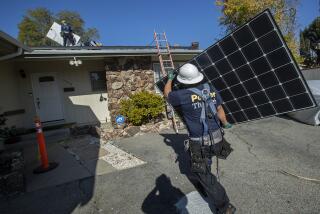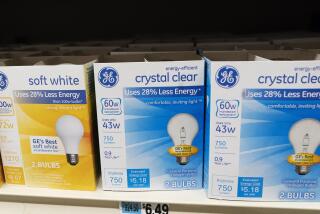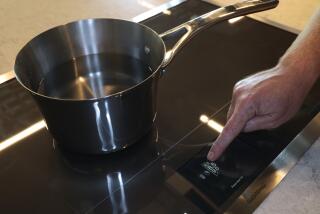Powerful Ideas
- Share via
Up, up, up goes the cost of living. But down, down, down has at least come the cost of operating most major home appliances. So reports the Assn. of Home Appliance Manufacturers, which offers some interesting comparative figures to prove its case. Here is how the energy efficiency of appliances manufactured in 1986 compares with the efficiency of those made in 1972:
A 1986 freezer uses 48% less energy. At a national average utility cost of 8.04 cents per kilowatt-hour, that represents a yearly saving of $56.76.
A refrigerator uses 35.5% less energy, for a saving of $49.28 a year.
A room air conditioner operates with 22% less energy, providing an annual saving of $22.67.
Running a load of clothes through a washer costs 9.5 cents less than it used to, thanks to a 31% saving in energy consumption. Running the dishwasher costs 12 cents less, because of a 36.5% improvement in energy efficiency.
Further improvements are coming. In 1987, for the second year in a row, Congress passed the National Appliance Energy Conservation Act, which was broadly supported by manufacturing, environmental and consumer groups. Despite its support from the affected industry, President Reagan pocket-vetoed the 1986 measure on the usual grounds that it intruded on the free market. Congress came back early in 1987 with a nearly identical measure that Reagan was persuaded to sign.
The standards that were set by that measure require a phased-in 15% to 25% improvement in efficiency, with the law taking effect for different appliances over a five-year period. Home appliances that operate on less electricity save consumers money, reduce oil imports and require fewer expensive new power plants. California recognized this long ago when it set its own efficiency standards for appliances sold in the state. There was a time when some in the appliance industry cried Woe! and said that major improvements in efficiency couldn’t be made. With research and innovation, they discovered that they were wrong, and so everyone is better off.
More to Read
Inside the business of entertainment
The Wide Shot brings you news, analysis and insights on everything from streaming wars to production — and what it all means for the future.
You may occasionally receive promotional content from the Los Angeles Times.










